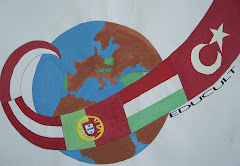In an approaching New Year 2010 many occasions for smiling and laughing, many successes at work and no misunderstandings with anyone.
Polish teachers, students and staff of our school.
CASTELO DE ALMOUROL
6 years ago
This is a blog for sharing and publishing through the Comenius Project









Our students willingly take part in many competitions of different range. They achieve many successes:




















Fritz, The Austrian partner had been ill for two weeks.. We would like to say him "may you recover soon, friend. We want to see you among us, asap"..
I hope Austrian partner association will take its place between us to competition..
We're looking forward to see all logos and slogans to voting.. I'd seen Portuguesan and Hungarian partners' materials and I can say that, rivals are seen very strong, I was afraid of them :)
Nonetheless, I know we will win the gold medal :)
Thank you all of you, its very nice and its a honour to me that we are together..


